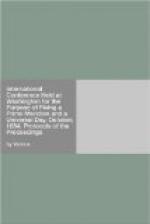Generally, in determining longitude, the country adopts the principal place within its confines as a subsidiary prime meridian, and the assumed longitude of this place is necessarily selected somewhat arbitrarily. The longitude, for instance, of Washington was, thirty years ago, known to be nearly 5 hours 8 minutes and 12 seconds west from Greenwich. Had we adopted this difference by law, it would have amounted to choosing for our prime meridian a point 5 hours 8 minutes and 12 seconds east of Washington, whether we happened to strike the transit instrument at Greenwich or not. This would have fixed an assumed longitude for the Cambridge observatory and for all points within our telegraphic net-work. We should have had a practical system, which might, however, require to be corrected from time to time, if some slight error were found in the assumed longitude of Washington.
In the present state of astronomical observation these little errors are of no consequence except in some very refined astronomical discussions. For all geographical and perhaps geodetical purposes the error may be regarded as zero, and it may be said, in regard to astronomical work, that it will always be independent of any meridian that might be chosen.
But even if this difficulty were avoided, he could not see how they could have any place which would come within the definition of a neutral meridian. Supposing they took the Azores, they belong to Portugal; then certainly they would have a Portuguese prime meridian, belonging to the Portuguese nation. Thus they would no longer have a neutral point, if he (Professor NEWCOMB) rightly understood the meaning of Professor JANSSEN.
He said that the Delegate of Great Britain, Professor ADAMS, had expressed very clearly his (Professor NEWCOMB’S) ideas, and the difficulty we have in meeting the propositions of the French Delegates; that what he had said would apply very properly to any neutral meridian that might be chosen in accordance with the plans of Professor JANSSEN. Whatever that meridian might be, we must always assume for it a certain number of degrees from the capital of the country, where the place to be determined is located, and then take that imaginary meridian instead of a real point on the surface of the globe.
It is true that this is perfectly practicable, and on that theory there might not be any necessity of having an astronomical observatory. But why we should go to this trouble and expense Mr. JANSSEN did not make very clear; his considerations were purely sentimental, as was remarked by the Delegate of Great Britain, Professor ADAMS, and he (Prof. NEWCOMB) did not see what advantage would be gained by a neutral meridian in preference to one fixed by convenience.




